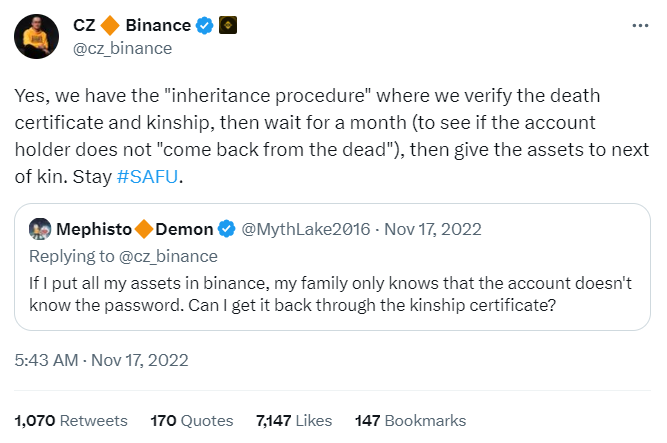
Crypto inheritance is an unpopular and often overlooked topic within the cryptocurrency market for good reason. In the endless search for new revolutionary technology or the next 100x meme coin like Shiba Inu (SHIB), no one wants to think about the fact that they might die before realizing other-worldly profits.
It’s a sobering thought but one that’s crucial for any crypto enthusiast to consider. After all, around four million bitcoins are presumed lost in inaccessible wallets. I certainly don’t want to add to that figure. It’s even speculated that Satoshi Nakamoto’s fortune is only untouched because the mythic icon has already moved on.
Without trying to sound morbid, it’s time to ask the sobering questions. What happens to your crypto assets when you die and how you can ensure your digital wealth doesn’t vanish into the ether?
Table of Contents
What Is Crypto Inheritance Planning?
Crypto inheritance planning is the process of preparing for the transfer of your cryptocurrency assets in the event of your unexpected demise. Think of it like a crypto roadmap, guiding your loved ones on how to access and manage your digital wealth when you’re no longer able to do so.

While it might seem as simple as just jotting down your seed phrase on a piece of paper and locking it in a safety deposit box with a set of basic instructions, that’s not always the case.
That slip of paper quickly becomes the key to your entire digital wealth, which could easily fall into the wrong hands. Crypto inheritance planning ensures that your digital assets, from Bitcoin (BTC) and Ethereum (ETH) to NFTs and stablecoins are safely passed on to your beneficiaries.
It’s about navigating the complex landscape of crypto laws, taxes, and security protocols to ensure your digital inheritance doesn’t get lost. In the same way that blockchain technology is designed to exist forever, crypto inheritance planning is about transferring your digital currency into something tangible and enduring for your family members and loved ones.
Why Is Having a Bitcoin Inheritance Plan so Important?
A Bitcoin inheritance plan is more than just a safety net; it’s a lifeline for your digital assets. Without a clear plan in place, your Bitcoin and any other types of cryptocurrency you hold might end up wasting away in an inaccessible wallet until the end of time.
Sponsored
The decentralized nature of cryptocurrencies is a double-edged sword. On the one hand, it offers maximum control and self-custody over your wealth, free from the constraints of traditional banking systems.
On the other hand, it means that there’s no central authority to turn to if you lose access to your crypto wallet. If you pass away without sharing your private keys or wallet details, your digital assets will be locked away forever.
If that wasn’t complicated enough, cryptocurrency inheritance’s legal landscape is still evolving. Without a clear plan, your heirs could find themselves entangled in legal complexities or facing hefty tax liabilities.
Before diving into the nitty-gritty details (or lack of) around crypto inheritance tax, let’s explore some of the most common ways that crypto investors pass on their portfolios.
How Can Crypto Enthusiasts Pass on Their Digital Assets?
Passing on digital assets is a relatively new concept, but it’s rapidly gaining importance as more people invest in cryptocurrencies. There are several methods available to crypto enthusiasts that ensure their digital wealth doesn’t disappear into the digital abyss when they’re gone.
Write a Will
It might surprise you, but the traditional approach to estate planning still holds weight in the digital world. Writing a will is a straightforward way to designate who will inherit your cryptocurrencies after your death. You can specify the types of digital assets you own, where they’re stored, and who should receive them.

Who knows, that lazy uncle might regret giving you socks for every birthday when they see your Yuga Labs NFT collection.
Unfortunately, due to the unique nature of cryptocurrencies, simply mentioning them in your will is not enough. You’ll need to provide a way for your executor or beneficiaries to access your digital wallets. This could mean entrusting someone with your private keys or providing instructions on where to find them.
Like everything in the crypto space, privacy and security are paramount. Never directly include sensitive details like your private keys in your will, as it becomes a public document after your death.
Use Crypto Exchanges
Cryptocurrency exchanges, like Binance and Coinbase, are platforms where you can buy, sell, and hold cryptocurrencies. Some investors prefer to keep their digital assets on these exchanges due to their user-friendly interfaces and security measures.

In the context of crypto inheritance, some exchanges have procedures in place to transfer the ownership of assets in the event of a user’s death. This process typically involves providing the exchange with certain documents, such as a death certificate and proof of identity for the beneficiary.
What makes this process complicated is that each exchange has different processes for handling crypto inheritance. Policies vary significantly between exchanges, and not all platforms may support inheritance processes.
On top of that, keeping your assets on an exchange means trusting a third party with your wealth. As we’ve seen all too often, cryptocurrency exchanges are always liable to security breaches, hacks, and insolvencies.
If you choose to use a crypto exchange for inheritance purposes, we recommend that you thoroughly research the platform’s policies and communicate these details to your beneficiaries ahead of time.
Blockchain-Based Crypto Inheritance
In the true spirit of decentralization that underpins cryptocurrencies, some solutions for crypto inheritance are being built directly on the blockchain. These blockchain-based methods offer a way to pass on your digital assets without relying on traditional legal structures or third-party services.
One such method involves using smart contracts, self-executing contracts with the terms of the agreement directly written into code. In theory, a smart contract could be programmed to release your assets to designated addresses (belonging to your heirs) upon certain triggers.
But how will the blockchain know that I’ve passed away? Well, these triggers could refer to a specific date or a prolonged period of inactivity on your part, suggesting that you may no longer be able to manage your assets.
Another bright idea is to use multi-signature wallets, which require more than one key to authorize a transaction. You could set up a multi-signature wallet with your heirs as co-signers, ensuring they can access your assets when needed.
While these methods offer a high degree of control and autonomy, they also require a certain level of technical expertise. Moreover, they don’t inherently solve issues like potential tax liabilities or beneficiary disputes.
Inheritance Tax on Crypto Assets
Like real-world assets, cryptocurrencies are subject to inheritance tax in most countries around the world. To give you the blanket term, inheritance tax is levied on the estate (money, possessions, and property) of someone who’s died.
Unless you live in a crypto tax paradise like Dubai, cryptocurrencies are considered taxable property. This means that your heirs might need to pay inheritance tax on the market value of the cryptocurrencies they inherit.
It’s also worth noting that tax laws around cryptocurrencies are still evolving and can be complex. For instance, there may be additional tax implications if your heirs sell or trade the cryptocurrencies they inherit.
Because every jurisdiction handles crypto inheritance tax differently, there is no one-size-fits-all solution. It’s always recommended to consult with a tax professional or legal advisor when planning for crypto inheritance.
Pros and Cons of Crypto Inheritance
Like any aspect of managing digital assets, crypto inheritance comes with its own set of advantages and challenges. Understanding these pros and cons helps you make informed decisions about the best way to secure your digital legacy.
Pros
- Full Control Over Your Digital Assets – Even after your death, you still have control over what happens to your digital assets. You decide who inherits your cryptocurrencies and provide them with the necessary tools and information to access them.
- Avoidance of Asset Loss – With a clear inheritance plan, you ensure that your digital wealth is passed on to your loved ones, instead of being lost to the blockchain forever.
- Privacy – Cryptocurrencies offer a high level of privacy compared to traditional assets. With the right planning, you can pass on your digital assets to your heirs in a way that respects this privacy.
- Decentralized Options – Smart contracts and blockchain-based services can automate the inheritance process, making it easier and more secure.
Cons
- Complexity – Dealing with inheritance is hard enough as it is. On top of the emotional strain, people who don’t know anything about the crypto space will be easily overwhelmed by the technical complexities.
- Security Risks – Scams and hacks are common in the world of crypto. If your seed phrase or private keys are compromised, your digital assets could be stolen. This risk extends to your heirs, who must also secure their access to your assets.
- Regulatory Uncertainty – The legal landscape for cryptocurrencies is in a constant state of flux. Laws and regulations around crypto inheritance are wildly different depending on where you live, adding an extra layer of uncertainty to the planning process.
- Access Difficulties – If your beneficiaries are not familiar with cryptocurrencies, they may struggle to access and manage the digital assets they inherit.
On the Flipside
- Most crypto investors are from a younger demographic. This is perhaps why the subject of crypto inheritance hasn’t been given the attention it deserves.
Why This Matters
Even if you’re in perfect health, it’s important to have a crypto inheritance plan set in place so that you’re digital wealth can be passed on to your loved ones.
FAQs
If a deceased person established a clear inheritance plan for their crypto, those assets will be passed on to their beneficiaries as decreed. However, if there was no plan in place, the crypto assets will likely sit in an inaccessible wallet forever.
Yes, crypto assets, including digital currencies and NFTs can be inherited if the deceased has a designated crypto inheritance plan.
To pass crypto as inheritance to your beneficiaries, make sure you have a crypto inheritance plan that outlines how your digital wealth should be divided and provide clear instructions on how to access your wallets and accounts.
